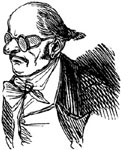
From the Narthex
Ed. Note: In this special section, which runs as an occasional feature, we present samples of the offerings in the Narthex, the NOR’s online blog. If you like what you read, visit newoxfordreview.org/narthex for more — much more! Our bloggers, in addition to James G. Hanink and Jason M. Morgan, include Richard M. Dell’Orfano, Magdalena Moreno, David Daintree, Barbara E. Rose, and, occasionally, Pieter Vree. The Narthex is updated on a regular basis, so there’s never a shortage of NOR material to read and reflect on.
Outrage & Serenity
By James G. Hanink
James G. Hanink is an independent scholar, albeit more independent than scholarly!
From time to time, I’ve told people that outrage is the proper response to the outrageous. After all, ignoring the outrageous would be an outrage, wouldn’t it? And it’s outrageous that we so often ignore the outrages of the day.
Sounds plausible, or at least it did to me. But I got it wrong. (Family and friends tell me this has happened more than once.)
I have a test case to show just how wrong I was. The case is so serious that I need to beg my readers, here and now, to shift gears.
The U.S. Conference of Catholic Bishops has been wrangling with the theme of “eucharistic coherence.” One aspect of that coherence is how the bishops ought to respond to the reception of the Eucharist by Catholic politicians who support and aggressively advance legal abortion.
Such politicians do so despite Pope St. John Paul II’s 1995 encyclical Evangelium Vitae, which teaches that “those who are directly involved in lawmaking have a ‘grave and clear obligation to oppose’ any law that attacks human life. For them, as for every Catholic, it is impossible to promote such laws or to vote for them.”
Nonetheless, Luis Cardinal Ladaria, prefect of the Congregation for the Doctrine of the Faith, cautioned our bishops lest a national policy “become a source of discord rather than unity within the episcopate and the larger Church in the United States.” A national policy, moreover, should come only after “extensive and serene dialogue.” Local bishops, he noted, would do well to “engage in dialogue with Catholic politicians within their jurisdictions” as a “means of understanding the nature of their positions and their comprehension of Catholic teaching.”
You May Also Enjoy
We’ve made little progress in convincing Americans that abortion is wrong, and now we don’t even have a major pro-life political party since the Republican abdication.
The elderly and the under-pressure organ donor have reason to distrust the falsely compassionate, as advocates of legalized euthanasia threaten to undermine the foundation of medical care as we've known it.
Our life, and each life, is really God’s and no one else’s, and must be treated as such. Life is not something we earn or something owed to us, it is purely a gift.

